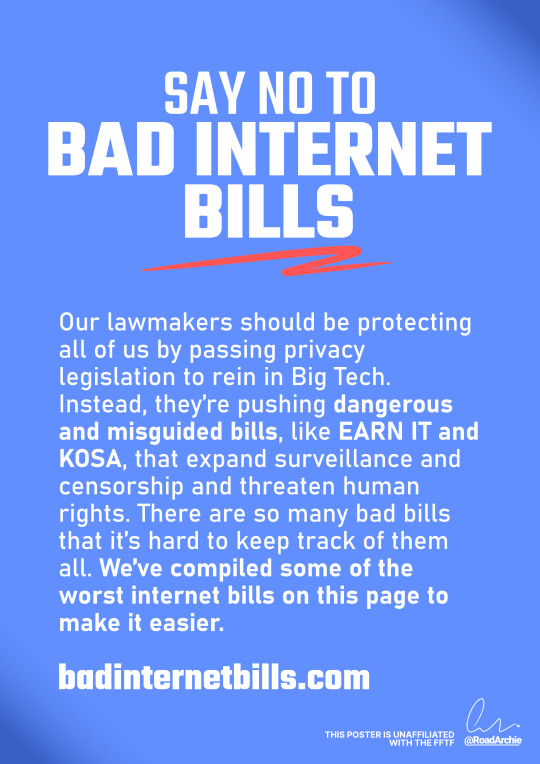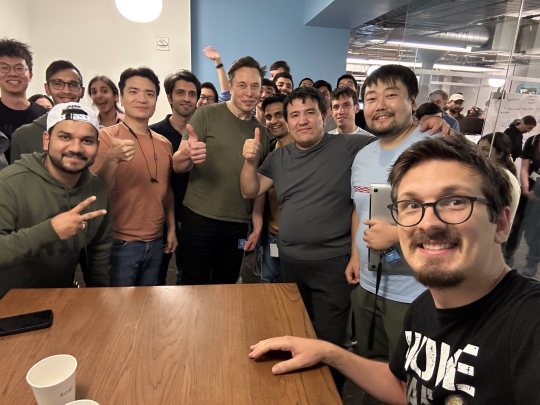#BigTech
Photo

If you don't want a man unhappy politically, don't give him two sides to a question to worry him; give him one. Better yet, give him none. Let him forget there is such a thing as war. If the government is inefficient, top-heavy, and tax-mad, better it be all those than that people worry over it. Peace, Montag. Give the people contests they win by remembering the words to more popular songs or the names of state capitals or how much corn Iowa grew last year. Cram them full of noncombustible data, chock them so damned full of 'facts' they feel stuffed, but absolutely 'brilliant' with information. Then they'll feel they're thinking, they'll get a sense of motion without moving. And they'll be happy, because facts of that sort don't change.
- Ray Bradbury, Fahrenheit 451
#bradbury#ray bradbury#quote#author#writer#bigtech#internet#useless information#dystopia#brave new world#information vs knowledge#distraction#rage wars#culture wars#society#culture
229 notes
·
View notes
Text
Boycott Israel
and another thing, ima about to fuck with yall's websites. gotta do that whole shit over bc guess what
Wix
Squarespace
are affiliated with Israli bigtech. (squarespace actually is based in Israel)
Shopify is Canadian
web.com is American
IONOS is German
godaddy bought an Israli company, I wont boycott companies unless they are significant to Israeli industry. I want to clarify this is not out of hate this is a way to be heard. The purpose of boycotting is to create a dip in sales that gets noticed by big businesses. This can be used as leverage but more of a push to do the morally correct thing. Do not do things out of hate or anger, okay?
Funny how Israel's tech industry is so big but there's poverty next door. What can BIGTECH do to nourish the general welfare surrounding Israel?
#man ik some of yall got online business#just invest into something new when you get the next chance ok no stress#bigtech#technology#e-commerce#e commerce#this was my 222 post#spiritual shit ftw#blog#free palestine#israel boycott#israel occupation#Israel#palestine#west banks#gaza#gaza strip#human rights#social justice#post#blogging#wzup#wzuplovely#wix#shopify#marketing#ionos#web.com#website#developement
8 notes
·
View notes
Quote
Big Tech workers are split into two camps: blue badges (salaried employees) and green badges (contractors). Whenever there is a slack labor market for a specific job or skill, it is converted from a blue badge job to a green badge job. Green badges don't get the food or the massages or the kombucha. They don't get stock or daycare. They don't get to freeze their eggs. They also work long hours, but they are incentivized by the fear of poverty.
The moral injury of having your work enshittified
7 notes
·
View notes
Text
Caccia agli storni: come i maestri curano le greggi
Le informazioni curate, anticipate rispetto ad altre informazioni sui feed di notizie delle persone, possono influenzare notevolmente il comportamento della folla. È una forma di ingegneria sociale.
Continua a leggere →
50 notes
·
View notes
Text

“Farmer vs Server Farm”
Illustration by Danny Hellman for VIRGINIA LIVING
12/19/16
2 notes
·
View notes
Text
instagram
Work by Taylor White in Ann Arbor, MI.
#taylorwhite#neuralink#artificialintelligence#ai#bigtech#socialdilemma#annarborartcenter#art#urbanart#streetart#arteurbano#artecallejero#streetarteverywhere#streetartdaily#streetartphotography#instastreetart#impermanentart#mural#publicart#annarbor#annarbormichigan#annarbormi#michigan#annarborstreetart#ontour
2 notes
·
View notes
Text
The Brotherhood of Big Tech

View On WordPress
7 notes
·
View notes
Text

i made this poster to get more eyes on their website.
#fightforthefuture#fight for the future#fftf#earnit#kosa#stopcsam#saynotobadinternetbills#badinternetbills.com#batinternetbills#bigtech#politics
3 notes
·
View notes
Text
A história do Youtube
youtube
Essa é a história da maior plataforma de vídeos online que revolucionou a internet de formas inexplicáveis.
O Youtube é uma gigante da tecnologia e sua história é fascinante!
Eu fui no canal TecMundo para reagir ao vídeo explicando mais essa história. Vem comigo!
Envie sugestões:
[email protected]
Siga em todas redes sociais:
@cyberchaostags
#youtube#youtubers#google#youtubecreators#youtuberewind#criadoresdeconteudo#bigtech#bigtag#videocast#livestream#livestreaming#live#vlogger#react#casting#broadcast#monetizar#monetizando#monetize
3 notes
·
View notes
Photo


Νέκυες κοπρίων εκβλητότεροι.**
- Heraclitus
Corpses are more useless than dung.**
When Elon Musk took over Twitter in early November, he got rid of Twitter’s CEO, CFO, and chief legal officer on his first day. Musk then gave Twitter employees an ultimatum in a midnight email: commit to a “hardcore” culture at Twitter or leave with a generous severance. Barely three weeks later he purged nearly two-thirds of Twitter’s 7500-person workforce, around 3700 employees.
“What works at SpaceX and Tesla is people being in the office and being hardcore,” said Musk during his first meeting with Twitter employees following the lay offs. In his Tweet defending the layoffs, Musk said all departing employees were offered "3 months of severance, which is 50% more than legally required". Musk has also fired as many as 5500 additional contract Twitter employees recently to cut down on bloated staff and waste of resources.
The mass layoffs prompted knee jerk concerns about content moderation, with NGOs and campaigners claiming the changes could mean more harmful material or misinformation on the site. Most of those culled or those who left voluntarily were from teams responsible for communications, content curation and moderation, human rights, human resources, and marketing.
The language of hard work and commitment demanded by Musk to remaining Twitter staff was mirrored in an email to Twitter employees entitled ‘Twitter 2.0’. “Going forward, to build a breakthrough Twitter 2.0 and succeed in an increasingly competitive world, we will need to be extremely hardcore. This will mean working long hours at high intensity. Only exceptional performance will constitute a passing grade. Twitter will also be much more engineering-driven. Design and product management will still be very important and report to me, but those writing great code will constitute the majority of our team and have the greatest sway. At its heart, Twitter is a software and servers company, so I think this makes sense.”
It sure does. After clearing house of deadwood, Musk has gone on a hiring spree at Twitter, mainly for more talented software engineers.
The two pictures above tell their own story. The top picture were staff who resigned or were culled. Many complained of their ‘inhumane treatment’ at Musk’s demands whilst others were left in tears or were distraught.
The second bottom picture is of remaining Twitter staff - overwhelmingly software engineers - happily working in the trenches at 1.30am with their new boss who was also putting in the hours alongside them.
56 notes
·
View notes
Text
Mark Zuckerberg Gave Fauci His Personal Phone Number Before Facebook Launched COVID Censorship Campaign
http://dlvr.it/SXtm1L
1 note
·
View note
Quote
Big Tech's most aggressive privacy invaders have long flown Irish flags. Ireland is "headquarters" to Google, Meta, Tinder, Apple, Airbnb, Yahoo and many other tech companies. In exchange for locating a handful of jobs to Ireland, these companies are allowed to maintain the pretense that their global earnings are afloat in the Irish Sea, in a state of perfect, untaxable grace.
Ireland’s privacy regulator is a gamekeeper-turned-poacher
16 notes
·
View notes
Text
Espansione globale della tecnologia di sorveglianza di massa
Le tecnologie di sorveglianza di massa messe in atto per proteggere la salute pubblica durante la pandemia di COVID-19 non sono scomparse. Invece sono stati ampliati…
Continua a leggere →
35 notes
·
View notes
Text
Proteggiamo insieme internet con la interoperabilità

Il web come bene comune non è un’utopia. Cory Doctorow, scrittore e attivista, individua nell’interoperabilità la via necessaria per costruire una rete più giusta. Cory Doctorow non si risparmia. È uno scrittore di fantascienza di successo, è un pioniere dei blog, è un attivista che si batte per la giustizia sociale e la salvaguardia dell’interpretazione aperta e libera di internet ed è un saggista che si dedica con attenzione straordinaria a comprendere le conseguenze delle norme che regolano la vita digitale. Chi lo incontra per la prima volta non può che restare profondamente colpito dalla sua disponibilità.
E chi poi inizia una corrispondenza con Doctorow non può che restare a bocca aperta per la velocità con la quale riesce a rispondere ai messaggi di mail che riceve, pur essendo il suo indirizzo di posta elettronica pubblico e la sua fama quella di un personaggio di rilevante notorietà. In vista della sua conferenza (il 21 aprile 2024) alla prossima Biennale Tecnologia di Torino, ha trovato il tempo di parlare con Nòva, mentre si occupava del tour in California per la presentazione del suo nuovo romanzo, «The Bezzle», il secondo della serie centrata sulle vicende del revisore finanziario forense Martin Hench.
In preparazione dell’intervista, Doctorow ha confermato la sua visione profondamente critica ma costruttiva del mondo digitale che naturalmente vede come un ecosistema la cui evoluzione non è definita soltanto dalla dimensione tecnologica, ma piuttosto dalla complessità delle dinamiche sociali ed economiche sottostanti. E ha chiesto come un favore di essere per una volta esentato da domande sull’intelligenza artificiale, un argomento che considera «persino più stupido del bitcoin». Naturalmente, così è avvenuto: ma le motivazioni di questo giudizio sono indirettamente emerse nella conversazione. E si sono rivelate molto istruttive.
Come si è evoluto il web rispetto alle origini

Doctorow rappresenta, in effetti, una versione contemporanea della cultura digitale originaria. Il web era nato come un bene comune. I valori degli scienziati del Cern di Ginevra - dove è stato progettato come sistema per facilitare l’uso di internet come strumento per la condivisione della conoscenza - si sono riversati nella cultura di chi lo ha adottato all’inizio dell’epopea digitale.
Poi, lentamente, molto è cambiato. Nella seconda metà degli anni Novanta, la decisione dell’amministrazione americana guidata da Bill Clinton e Al Gore di deregolamentare le attività economiche che si sviluppavano sul web e conseguente accelerata commercializzazione della rete, attirò ingenti capitali finanziari e lanciò una fase molto diversa.
Tra bolle speculative e grandi innovazioni, il valore reale della rete si è accresciuto, quasi cinque miliardi di persone si sono connesse, una decina di gigantesche imprese hanno preso il controllo della gran parte della ricchezza generata in Occidente dalle attività digitali, i diritti delle persone che lasciano i loro dati in quelle piattaforme non sono stati particolarmente salvaguardati. Ma l’obiettivo di salvaguardare e coltivare quel bene comune del web non è certo scomparso. E che cosa vede Doctorow davanti a noi, da questo punto di vista?
La trappola delle big tech
Uno scrittore di fantascienza non prevede il futuro come Nostradamus» dice Doctorow: «Cerca alternative». E un attivista? «Crede nella possibilità che l’azione umana possa realizzare l’alternativa più giusta». Mentre un saggista: «Studia le forze che facilitano il raggiungimento degli obiettivi». Quali forze? «Come dice Lawrence Lessig, è più facile che qualcosa succeda se è profittevole, legale, tecnologicamente possibile e accettabile secondo le norme sociali». Big Tech ha approfittato di queste regole, evidentemente. Possono riuscire a cavalcarle anche coloro che cercano di sviluppare una rete aperta, libera, interoperabile?
Doctorow crede che la strategia dell’interoperabilità sia potentissima. Secondo lui, di fatto, diversi miliardi di utenti delle grandi piattaforme digitali si sono trovati intrappolati nella versione della rete definita dalle strategie di Big Tech. Ma la via della liberazione è chiara: immaginare le alternative, chiarirsi le idee su quali sono le possibilità più adatte per lo sviluppo umano, definire gli obiettivi e credere nella possibilità di fare qualcosa di importante per realizzarli.
«Le leggi antitrust sono le regole fondamentali. Vanno fatte valere. Non soltanto per difendere i consumatori: ma anche per difendere i lavoratori e i cittadini. E intanto la società può lavorare per costruire la rete giusta: quella che si muove all’insegna dell’interoperabilità». La chiave per ricreare una rete aperta e innovativa è che gli utenti possano sempre cambiare tecnologia. Il che avviene se nessuna tecnologia può chiudere i suoi utenti in uno spazio dal quale non possono uscire.
Interoperabilità e antitrust al servizio dei cittadini
«È un obiettivo molto pratico» dice Doctorow. «La libertà degli utenti è una conquista possibile. Le Big tech non sono tanto sofisticate da avere messo in piedi un sistema di controllo delle menti insuperabile. Semplicemente si muovono molto velocemente. E questo mette in grandi difficoltà i propugnatori di alternative».
La risposta di Doctorow è articolata: un’antitrust al servizio dei cittadini, un ecosistema di innovatori che trovano il modo di generalizzare l’interoperabilità, un nuovo sviluppo di corpi intermedi e sindacati. Perché non è la tecnologia a determinare il futuro. È la società, con le sue dinamiche profonde, che torce anche la tecnologia nella direzione che ha scelto di seguire. E questo vale anche per l’intelligenza artificiale.
Read the full article
0 notes
Text
The craziest part of big tech destroying the cost of living everywhere by paying obscene salaries
The engineer-being-paid-200k's job at this point is largely to make websites WORSE
#let me copy paste#I just want to translate something#I just want to search more info on an artist#constantly checking for malware because you slipped another ad in a weird place#Id use adblock but these MFs will make me pay for a subscription#at least you can still get around paywalls with archival sites#bigtech#dystopia#capitalism
0 notes